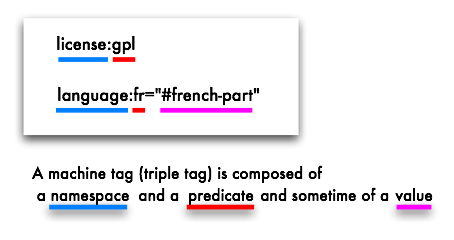30 Matching Annotations
- May 2022
-
www.bobdc.com www.bobdc.com
Tags
Annotators
URL
-
-
www.bobdc.com www.bobdc.com
-
sparql PREFIX osmt: <https://wiki.openstreetmap.org/wiki/Key:> SELECT * WHERE { ?museum osmt:addr:city "New York"; osmt:tourism "museum"; osmt:wikidata ?wikidataID . }
Tags
Annotators
URL
-
-
twitter.com twitter.com
-
You can now tag citations in @CiteULike with #CITO! Add the tag "cito--(relationship)--permalink". Example:"cito--usesmethodin--423382".
-
-
jodischneider.com jodischneider.com
-
Machine Tags
cito--cites--1375511says “this article CiTO:cites article 137511”.
-
-
www.flickr.com www.flickr.com
Tags
Annotators
URL
-
-
wiki.openstreetmap.org wiki.openstreetmap.org
Tags
Annotators
URL
-
-
wiki.openstreetmap.org wiki.openstreetmap.org
Tags
Annotators
URL
-
-
davide.eynard.it davide.eynard.it
-
www.flickr.com www.flickr.com
-
eatyourgreens.org.uk eatyourgreens.org.uk
-
vimeo.com vimeo.com
Tags
Annotators
URL
-
-
code.flickr.net code.flickr.net
-
code.activestate.com code.activestate.com
-
Machine Tags
A new kind of tags — machine tags — are supported now. A machine tag, e.g.
meta:language=pythonconsists of a namespace (meta), a key (language) and a value (python). Everyone can created machine tags, but the meta: namespace is protected and tags in there will be created by the site itself.The codesite itself uses machine tags to make various properties of recipes accessible to the search:
-
meta:languageThe programming language of the recipe, e.g. python, perl or tcl.
-
meta:min_$lang_$majorverThose tags describe the minimum language version. If a recipe requires Python 2.5 it would have the tag
meta:min_python_2=5. -
meta:licenseThe license that was selected by the author, e.g. psf, mit or gpl.
-
meta:locThis tag contains a number describing the lines of code in a recipes. It counts only the number of lines in the code block but not any lines in the discussion of in comments. This makes it possible to search for short recipes with less than ten lines or very large ones.
-
meta:score
The current score of the recipe. This is the same number that is displayed besides the recipe title and can only be influenced by voting on recipes. That way you could even search for down-voted recipes
-
meta:requiresStores information about additional requirements of the recipes, e.g. required python modules. You can find recipes using python's collections module that way.
All those tags cannot be changed directly because they are generated from a recipe's properties.
-
Tags
Annotators
URL
-
-
gist.github.com gist.github.com
-
We also support machine tags that follow the pattern
NAMESPACE:KEY=VALUE. For example:geo:lat=43.555camel:size=mediummachine:tag=with spaceMachine tags are not revealed to the user on the track pages.
-
- Apr 2022
-
code.flickr.net code.flickr.net
Tags
Annotators
URL
-
- Mar 2022
-
-
So my idea was to create a machine-tag format based on Wikipedia topics, allowing any content creator to tag content with any topic in Wikipedia. By using Wikipedia as an index, this format provides very specific identification of content across a vast knowledge domain. Call it the Dewey Decimal System for the web: “The Wiki Decimal System.” In general, the problem with machine tags is how to make them easy to add for regular folks. Although the format itself is simple, the tags are typically lengthy and require you to know the data ID for what you want to tag. Enter my hack: A web page that takes your text and builds the list of Wikipedia machine tags automatically.
-
-
www.bbc.co.uk www.bbc.co.uk
-
musicbrainz.org musicbrainz.org
-
- musicbrainz:artist=<MBID>
- musicbrainz:release=<MBID>
- musicbrainz:track=<MBID>
- musicbrainz:label=<MBID>
-
-
mlvonschaper.wordpress.com mlvonschaper.wordpress.com
- Jan 2022
-
code.flickr.net code.flickr.net
-
code.flickr.net code.flickr.net
-
Tags
Annotators
URL
-
-
tagaholic.me tagaholic.me
-
- astro:name=NGC 4565
- astro:orientation=11.73
- astro:RA=189.083922302
The metadata is structured. So structured that we can represent the example machine tags in a table:
<table> <thead><tr> <th style="text-align:center">namespace</th> <th style="text-align:center">predicate</th> <th style="text-align:center">value</th> </tr> </thead> <tbody> <tr> <td style="text-align:center">astro</td> <td style="text-align:center">name</td> <td style="text-align:center">NGC 4565</td> </tr> <tr> <td style="text-align:center">astro</td> <td style="text-align:center">orientation</td> <td style="text-align:center">11.73</td> </tr> <tr> <td style="text-align:center">astro</td> <td style="text-align:center">RA</td> <td style="text-align:center">189.083922302</td> </tr> </tbody> </table>Or in a tree:
astro |-- name | `-- NGC 4565 |-- orientation | `-- 11.73 `-- RA `-- 189.083922302
-
-
mashupguide.net mashupguide.net
Tags
Annotators
URL
-
-
fr.slideshare.net fr.slideshare.net
-
www.flickr.com www.flickr.com
